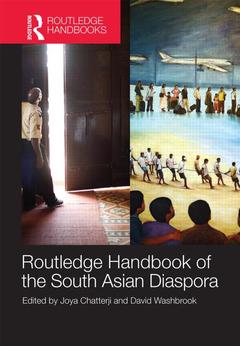Routledge Handbook of the South Asian Diaspora
Coordonnateurs : Chatterji Joya, Washbrook David

South Asia?s diaspora is among the world?s largest and most widespread, and it is growing exponentially. It is estimated that over 25 million persons of Indian descent live abroad; and many more millions have roots in other countries of the subcontinent, in Pakistan, Bangladesh and Sri Lanka. There are 3 million South Asians in the UK and approximately the same number resides in North America. South Asians are an extremely significant presence in Southeast Asia and Africa, and increasingly visible in the Middle East.
This inter-disciplinary handbook on the South Asian diaspora brings together contributions by leading scholars and rising stars on different aspects of its history, anthropology and geography, as well as its contemporary political and socio-cultural implications. The Handbook is split into five main sections, with chapters looking at mobile South Asians in the early modern world before moving on to discuss diaspora in relation to empire, nation, nation state and the neighbourhood, and globalisation and culture.
Contributors highlight how South Asian diaspora has influenced politics, business, labour, marriage, family and culture. This much needed and pioneering venture provides an invaluable reference work for students, scholars and policy makers interested in South Asian Studies.
Introduction Part 1: Mobile South Asians in the early modern world 1. The world of the Indian Ocean 2. The market for military labour in early modern north India 3. Scribal migrations in early modern India 4. Mobile artisans 5. Hawala and Hundi: vehicles for the long-distance transmission of value Part 2: Diaspora and empire 6. South Asian business in Empire and beyond 7. Indenture: Experiment and Experience 8. Wrecking homes, making families: Women’s recruitment and indentured labour migration from India 9. The age of the lascar. South Asian seafarers in the times of imperial steam shipping 10. South Asians in Britain up to the mid-nineteenth century 11. Warriors, workers, traders, and peasants: The Nepali/Gorkhali diaspora since the nineteenth century Part 3: Diaspora and nation 12. Seeking empire, finding nation: Gandhi and Indianness in South Africa 13. South Asian migration to the United States: Diasporic and national formation Part 4: Diaspora, nation states and the neighbourhood 14. From imperial Subjects to national citizens: South Asians and the international migration regime since 1947 15. The production of illegality in migration and diaspora: State policies and human trafficking from Pakistan 16. Out of India: Deobandi Islam, radicalism and the globalization of ‘South Asian Islam’ 17. Nationalising a diaspora: The Tibetan government-in-exile in India 18. Sri Lanka’s diasporas Part 5: Diaspora, globalisation and culture 19. Brain Drain, exchange and gain: ‘Hi-skill’ migrants and the developed economies 20. Transnationalism and the tranformation of ‘home’ by ‘abroad’ in Sylhet, Bagladesh 21. Indians abroad: Mixing it up 22. Bengalis in Britain: Migration, state controls and settlement 23. The Pakistani Diaspora: US and UK 24. Hinduism in the diaspora 25. Ritual, religion and aesthetics in the Pakistani and South Asian Diaspora 26. Europe’s Muslim passions 27. Diasporic cities in Britian: Bradford, Manchester, Leicester, London 28. Dis/Locating diaspora: South Asian youth cultures in Britain 29. Dress and the South Asian diaspora 30. Marriages of convenience and capitulation: South Asian marriage, family and intimacy in the Diaspora 31. Literatures of the South Asian Diaspora 32. Indian food in the USA: Adapting to culinary eclecticism33. Bollywood’s Empire: Indian Cinema and Diaspora
Joya Chatterji is Reader in Modern South Asian History at the University of Cambridge, UK, and a Fellow of Trinity College. Her publications include Bengal Divided: Hindu Communalism and Partition 1932-1947 (1995), The Spoils of Partition: Bengal and India, 1947-67 (2007) and co-author of The Bengal Diaspora (forthcoming 2013, Routledge). She is also the editor of the journal Modern Asian Studies.
David Washbrook is Senior Research Fellow at Trinity College, University of Cambridge, UK, and he has previously taught at Warwick, Harvard and Oxford Universities and the University of Pennsylvania. His major interests lie in the societies and cultures of southern India on which he has published extensively.
Date de parution : 12-2013
17.4x24.6 cm
Date de parution : 05-2018
17.4x24.6 cm
Thèmes de Routledge Handbook of the South Asian Diaspora :
Mots-clés :
UK Islamic Mission; Tamil Nadu; migrants; Desi Hip Hop; David Washbrook; Young Men; Dirk H.A; Kolff; Ali Bakhsh; Rosalind O'Hanlon; Double Entry Bookkeeping; Tirthankar Roy; Double Entry; Douglas Haynes; George Stubbs; Roger Ballard; Sabiha Sumar; Claude Markovits; South Asian Diaspora; Brij V; Lal; Young South Asian; Samita Sen; Nattukottai Chettiars; Ravi Ahuja; Exile Tibetan; Michael H; Fisher; South Asian Youth Cultures; David N; Gellner; South Asian Youth; Isabel Hofmeyr; Hawala Networks; Sandhya Shukla; Deobandi Islam; Ali Nobil Ahmad; South Asian American; Magnus Marsden; Steam Shipping; Fiona McConnell; Hindi Cinema; Nicholas Van Hear; Asian Dub Foundation; Katy Gardner; Hind Swaraj; Karen Leonard; De Boigne; John Eade; South Asian Migration; Yunas Samad; Maritime Labour; Zavos John; Pnina Werbner; Faisal Devj; William Gould; Claire Alexander; Helen Kim; Emma Tarlo; Perveez Mody; Jahanara Kabir Ananya; Jayanta Sengupta; Rachel Dwyer
